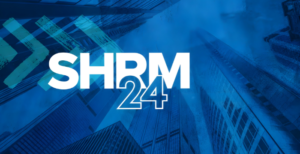SHRM 2024: A Recap of Insights and Innovations
By Nicole Martin, CEO of HRBoost LLC
Attending SHRM 2024 was an enlightening experience that underscored the evolving role of HR in today’s complex and dynamic workplace. The three-day event was packed with sessions that explored the intersection of technology, humanity, and leadership in HR. Here’s a detailed recap of the key themes and insights from each day, supported by highlights from the event.
 Day One: Embracing Complexity and Creating Value
Day One: Embracing Complexity and Creating Value
The first day of SHRM 2024 addressed the intricate challenges faced by HR professionals today, including managing a multigenerational workforce, polycrisis, and integrating AI. The emphasis was on being proactive and vocal to shape the future actively.
Strategic AI Integration: A major highlight was the discussion on the role of AI catalysts. These individuals are pivotal in driving strategic initiatives, connecting AI opportunities to business strategies, and securing the necessary resources. This theme aligns with the need for HR to transition from being order-takers to becoming embedded partners in the organization.
- AI Catalyst Roles: The role of AI catalysts in prioritizing AI opportunities, securing buy-in across the firm, and gradually changing the culture through AI integration was emphasized. Melissa Daley, President of Orca Intelligence, urged HR leaders to have a clear AI adoption strategy and to work closely with IT teams to ensure AI solutions benefit the organization without causing unintended consequences.
Promoting Empathy and Belonging: While the explicit discussion on empathy was not a focus, the underlying theme was its importance. Empathy fosters a sense of belonging and is crucial for creating an engaged and collaborative workforce. HR’s role in promoting civility and creating a culture where employees feel valued was a key takeaway.
Communication and Clarity: Effective communication and amplifying technology were highlighted as essential components for HR to succeed. The importance of clear communication, technology integration, and creating cohesion within teams was repeatedly emphasized.
- AI Integration Framework: This framework showed the central role of communication in AI fluency, foundation, operationalization, and experimentation.
Day Two: Navigating Ambiguity with AI and Humanity
The second day focused on the increasing ambiguity in the workplace and the necessity for constant evolution. Sessions emphasized that the only way forward is to embrace change and integrate AI thoughtfully.
AI+HI Maturity Grid: This framework showcased how organizations can progress in their AI adoption journey, from nominal to transformative stages. The importance of learning and strategic impact was highlighted, aligning with the need to keep humans at the center of AI initiatives.
- AI+HI Maturity Grid for Talent: The grid categorized organizations based on their maturity in AI integration, from disconnected experimenting to driving strategy.
Success Factors for AI Projects: Effective AI integration requires a clear vision, cross-functional collaboration, and tailored change management. These elements are essential for ensuring that AI enhances rather than hinders business operations.
- Success Factors for AI Projects: Key elements included a catalyzing leader, a biz/tech vision, and a tailored change management process. Kari Naimon, Founder/CEO of AixHR, emphasized the importance of keeping the human in the loop and learning how to use AI effectively without solely relying on AI tools.
Empathy and Ethics in AI: Embracing empathy and ethics in AI implementation was stressed. Maintaining a human-centric approach ensures authenticity and engagement in the workplace, which is crucial for maximizing the benefits of AI.
Day Three: Overcoming Fears and Biases in Leadership
The final day focused on the personal challenges leaders face, such as overcoming fears and biases. Continuous self-development and ethical decision-making were emphasized as critical components of effective leadership.
Economic Impact of AI: AI has the potential to significantly boost the global economy by $17.9 trillion by adopting a people-centered approach. This theme underscored the importance of integrating AI in a way that prioritizes human elements.
- Economic Impact of AI: Highlighted the potential $17.9 trillion improvement in economic impact through people-centered AI.
AI Catalyst Vision: AI catalysts play a crucial role in aligning stakeholders, forging a vision, and continuously learning from the implementation process. This reflects the need for critical thinking and ethical considerations in AI use.
- AI Catalyst Vision: Emphasized that AI catalysts do not necessarily write code but align stakeholders and execute projects effectively. Christopher Gross, Founder and CEO at Ascension Worldwide, reminded HR professionals to be intentional and aware of the information input into AI systems to avoid legal and ethical pitfalls.
Leadership and Integrity: Leaders must be courageous, humble, and disciplined. Making tough calls when integrity is compromised is essential for maintaining a positive organizational culture. Inclusivity and ethical decisions, especially with the rise of AI, were highlighted as top priorities.
SHRM 2024 provided a wealth of knowledge and inspiration, emphasizing the pivotal role of HR in integrating AI, promoting empathy, and leading with integrity. As we navigate the complexities of the modern workplace, it’s crucial to adapt, communicate effectively, and keep the human element at the forefront of all our endeavors.

